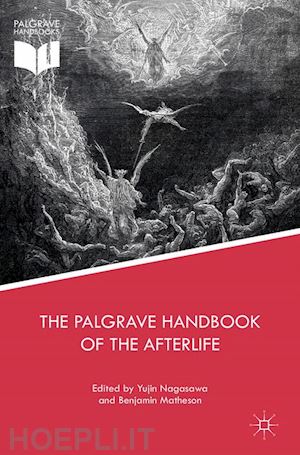
Questo prodotto usufruisce delle SPEDIZIONI GRATIS
selezionando l'opzione Corriere Veloce in fase di ordine.
Pagabile anche con Carta della cultura giovani e del merito, 18App Bonus Cultura e Carta del Docente
This unique Handbook provides a sophisticated, scholarly overview of the most advanced thought regarding the idea of life after death. Its comprehensive coverage encompasses historical, religious, philosophical and scientific thinking.
Starting with an overview of ancient thought on the topic, The Palgrave Handbook of the Afterlife examines in detail the philosophical coherence of the main traditional notions of the nature of the afterlife including heaven, hell, purgatory and rebirth. In addition (and breaking with traditional conceptions) it also explores the most recent exciting advance – digital models. Later sections include analysis of various possible metaphysical accounts that might make sense of the afterlife (including substance dualism, emergent dualism and materialism) and the science of near death experiences as well as the links between human psychology and our attitude to the afterlife.
Key features:
• Grounded in the most advanced philosophical, theological and scientific thinking
• Contributions by eminent scholars from the world’s top universities
• Balanced treatment of fundamental issues that are relevant to everyone
• Diverse approaches ranging from the religious to the scientific, from the optimistic to the pessimistic• A major section on the meaning of the afterlife which includes chapters on fear, purpose, evil, and issues regarding identity
The Palgrave Handbook of the Afterlife is essential reading for scholars, researchers and advanced students researching attitudes to and effects of beliefs about death and life after death from philosophical, historical, religious, psychological and scientific perspectives.
1. Introduction; Benjamin Matheson.- Part I. The History of the Afterlife.- 2. The afterlife in early civilizations; Gregory Shushan.- 3. Classical Mediterranean Conceptions of the Afterlife; Stephen R. L. Clark.- Part II. The Afterlife in World Religions.- 4. Hinduism; Ankur Barua.- 5. Buddhism; Peter Harvey.- 6. Judaism; Tyron Goldschmidt and Aaron Segal.- 7. Christianity; Joshua Farris.- 8. Islam; Amir Dastmalchian.- Part III. Models of the Afterlife.- 9. Heaven; Luke Henderson.- 10. Divine Love and Hell; Andrei Buckareff and Allen Plug.- 11. Purgatory; David Hershenov and Rose Hershenov.- 12. Rebirth; Mikel Burley.- 13. Digital Afterlives; Eric Steinhart.- Part IV. The Metaphysics of the Afterlife.- 14. Substance Dualism; Uwe Meixner.- 15. Emergent Dualism; William Hasker.- 16. Resurrecting Material Persons; Lynne Rudder Baker.- Part V. The Meaning of the Afterlife.- 17. The Fear of Death; John Bishop.-18. Meaning in Life; Thaddeus Metz.- 19. The Problem of Evil; Stephen T. Davis. 20. Practical Identity; Benjamin Matheson.- Part VI. The Science of the Afterlife.- 21. Do Near Death Experiences Provide Evidence of an Afterlife?; Mark Fox.- 22. How Psychological Dispositions Influence the Theology of the Afterlife; Helen de Cruz and Johan de Smedt.
Yujin Nagasawa is Professor of Philosophy and Co-Director of the John Hick Centre for the Philosophy of Religion at the University of Birmingham, UK. His previous books include The Existence of God: A Philosophical Introduction (2011) and God and Phenomenal Consciousness: A Novel Approach to Knowledge Arguments (2008).
Benjamin Matheson is Postdoctoral Fellow at the Department of Philosophy, Linguistics, and Theory of Science, University of Gothenburg, Sweden. He has published papers in American Philosophical Quarterly, Philosophical Studies and the International Journal of the Philosophy of Religion.











Il sito utilizza cookie ed altri strumenti di tracciamento che raccolgono informazioni dal dispositivo dell’utente. Oltre ai cookie tecnici ed analitici aggregati, strettamente necessari per il funzionamento di questo sito web, previo consenso dell’utente possono essere installati cookie di profilazione e marketing e cookie dei social media. Cliccando su “Accetto tutti i cookie” saranno attivate tutte le categorie di cookie. Per accettare solo deterninate categorie di cookie, cliccare invece su “Impostazioni cookie”. Chiudendo il banner o continuando a navigare saranno installati solo cookie tecnici. Per maggiori dettagli, consultare la Cookie Policy.